

Links to hundreds of Psychology studies running on the internet. Sigmund Freud. Psychology's most famous figure is also one of the most influential and controversial thinkers of the twentieth century.
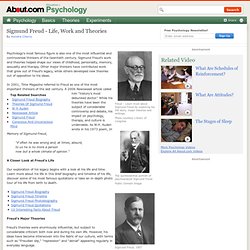
Sigmund Freud's work and theories helped shape our views of childhood, personality, memory, sexuality and therapy. Other major thinkers have contributed work that grew out of Freud's legacy, while others developed new theories out of opposition to his ideas. In 2001, Time Magazine referred to Freud as one of the most important thinkers of the last century. A 2006 Newsweek article called him "history's most debunked doctor. " While his theories have been the subject of considerable controversy and debate, his impact on psychology, therapy, and culture is undeniable.
"if often he was wrong and, at times, absurd, to us he is no more a person now but a whole climate of opinion. " A Closer Look at Freud's Life Our exploration of his legacy begins with a look at his life and time. Freud's Major Theories. The Interpretation of Dreams. The Interpretation of Dreams (German: Die Traumdeutung) is a book by psychoanalyst Sigmund Freud.
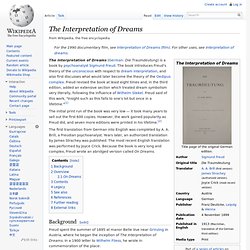
The book introduces Freud's theory of the unconscious with respect to dream interpretation, and also first discusses what would later become the theory of the Oedipus complex. Freud revised the book at least eight times and, in the third edition, added an extensive section which treated dream symbolism very literally, following the influence of Wilhelm Stekel. Freud said of this work, "Insight such as this falls to one's lot but once in a lifetime. "[1] The initial print run of the book was very low — it took many years to sell out the first 600 copies. The first translation from German into English was completed by A. Background[edit]
Totem and Taboo. Totem and Taboo: Resemblances Between the Mental Lives of Savages and Neurotics (German: Totem und Tabu: Einige Übereinstimmungen im Seelenleben der Wilden und der Neurotiker) is a 1913 book by Sigmund Freud.
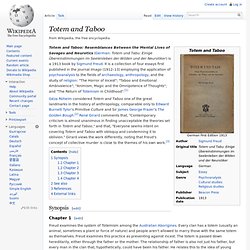
Iceberg theory. Id, ego and super-ego. Although the model is structural and makes reference to an apparatus, the id, ego and super-ego are purely symbolic concepts about the mind and do not correspond to actual somatic structures of the brain (such as the kind dealt with by neuroscience).
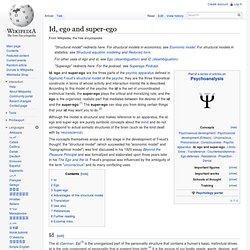
The concepts themselves arose at a late stage in the development of Freud's thought: the "structural model" (which succeeded his "economic model" and "topographical model") was first discussed in his 1920 essay Beyond the Pleasure Principle and was formalized and elaborated upon three years later in his The Ego and the Id. Freud's proposal was influenced by the ambiguity of the term "unconscious" and its many conflicting uses. Id[edit] According to Freud the id is unconscious by definition: In the id, "contrary impulses exist side by side, without cancelling each other out. ... Developmentally, the id precedes the ego; i.e., the psychic apparatus begins, at birth, as an undifferentiated id, part of which then develops into a structured ego. Carl Gustav Jung.
Best Known For: Studies of the human psyche.Dream analysisThe collective unconsciousArchetypes Birth and Death: Carl Jung was born July 26, 1875He died June 6, 1961 Early Life: Carl Gustav Jung was born in Kesswil, Switzerland to father Paul Achilles Jung, a pastor, and mother Emilie Preiswerk.
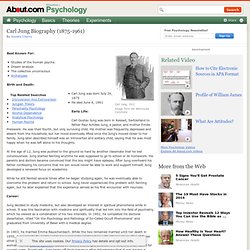
At the age of 12, Jung was pushed to the ground so hard by another classmate that he lost consciousness. While he still fainted several times after he began studying again, he was eventually able to overcome the problem and return to school. Career: Jung decided to study medicine, but also developed an interest in spiritual phenomena while in school. In 1903, he married Emma Rauschenbach.
Early in his career, Jung worked with psychiatric patients at the University of Zürich asylum. His time spent working with Sigmund Freud had a major impact on Jung’s later theories and helped him develop a fascination for the unconscious mind. Carl Jung's Contributions to Psychology Selected Works by Carl Jung. Introvert and extravert (psychology) Analytical psychology. Analytical psychology (or Jungian psychology) is a school of psychology that originated from the ideas of Swiss psychiatrist Carl Jung.
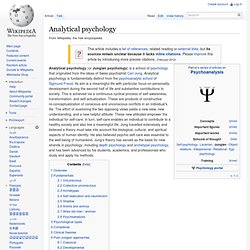
Analytical psychology is fundamentally distinct from the psychoanalytic school of Sigmund Freud. Its aim is a meaningful life with particular focus on personality development during the second half of life and substantive contributions to society. This is achieved via a continuous cyclical process of self-awareness, transformation, and self-actualization. These are products of constructive re-conceptualization of conscious and unconscious conflicts in an individual's life. The effort of examining the two opposing views yields a new view, new understanding, and a new helpful attitude. Overview[edit]
The 12 Common Archetypes. The 12 Common Archetypes By Carl Golden The term "archetype" has its origins in ancient Greek.
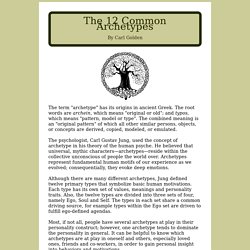
The root words are archein, which means "original or old"; and typos, which means "pattern, model or type". Dream Analysis » Dream Analysis, Jungian Psychology. World of Lucid Dreaming.